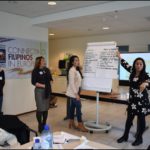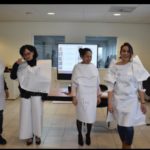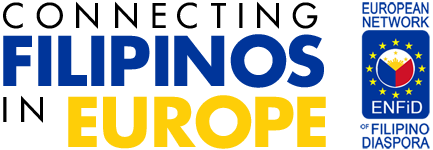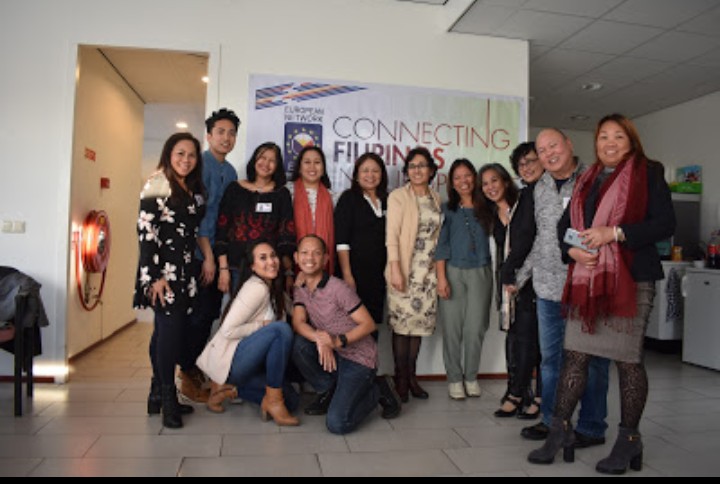Great minds discuss ideas; average minds discuss events; small minds discuss people – Eleanor Roosevelt
The European Network of Filipinos in the Diaspora (ENFiD) Netherlands held its one day leadership training program last March 24, 2018 in Venlo. The program was entitled: Effective Filipino Leadership: Effective Leadership as Mover of Change among Filipino Communities, which was given by Betsy von Atzigen. Although vast majority of the participants are Filipinos living in the Netherlands, there were also those who travelled all the way from Denmark and Germany. Betsy herself is from Switzerland.
ENFiD is a non-discriminatory organisation and welcomes all Filipinos in Europe regardless of their faith, gender, sexuality, political affiliations, ethnic background, etc. By drawing upon the common thread that binds us, the organization aims to connect us all who are re-rooted and still re-rooting in the host society.
The event is not only exclusive to the ENFiD leaders and members, although membership to ENFiD is encouraged. There are also those who are from other organisations, such as the Babaylan, Help Filipino Children, church organizations, and business establishments. I myself came to represent the recently established Filipino LGBT Europe I helped organized with other like-minded individuals. ENFiD welcomed the Filipino LGBT Europe to their already huge family and on behalf of the Filipino LGBT Europe board members, we are looking forward for many joint projects in many years to come.
As a new member, Diane Mondragon Halmans appointed me to write this article on the Leadership Training 2018 in Venlo. To give a complete report of how the day has progressed exactly the way it did is not my intention here. What I intend to do here instead is to provide a subjective account of how the event spoke to me on a more personal level. As such, this account is intended to be incomplete, so that others, who were also there, may fill-in the gaps. In that way, we can still continue the conversations that have already been instigated while we were together on that beautiful day.
I find the program to be unique, intensive, and highly collaborative. It was unique because, the seminar and workshops were specifically designed for Filipino leaders who are living in Europe. It seemed to me that the teaching materials were specially tailored for us. It was intensive because the speaker tackled various concepts relevant to leadership in general and Filipino leadership in particular. It could have been divided into few sessions and dispersed throughout a semester, but instead, it was squeezed into one single day.
That being said, it is also important to stress that although intensive, boring it was certainly not. Through the well-thought workshops, we were stimulated to reflect, discuss, and present. In other words, the event was very interactive. The impromptu role playsrole-plays did not only make our learning experience more fun but they also forced the creativity out of each one of us. Everybody was given a chance to shine.
Of all the workshops that were given that day, the one on the Filipino traits and mindset is what I find to be the most fascinating and confronting at the same time. In that workshop, we were instructed to reflect on our strengths and weaknesses, or as Betsy elegantly puts it: points of improvements.
What this particular exercise clearly showed is that the participants – and perhaps, we Filipinos in general – have a keen sense of who we are. We take pride to our strengths and values that are inherently Filipinos, but at the same time, we are also not afraid to face our mind-sets that interrupt our progress and that are harmful to our relationships with others.
One of the most recurring theme from that exercise is that while we Filipinos have a very strong community spirit, most of us are also easily discouraged by conflicts and confrontations. Generally speaking, we avoid conflicts as much as we can and run away from it. When we are confronted by views and arguments that do not agree to our own, we tend to take them personally, and more often than not, we lash-out when we are criticized. Gossips are also being used as a weapon which has a damaging effect to everyone involved.


The ultimate measure of a man [or a woman] is not where he [or she] stands in moments of comfort and convenience but where he [or she] stands at times of challenge and controversy – Martin Luther King Jr.
That day, we were all invited to look at conflicts in an entirely different light, namely, as an opportunity to learn from each other’s perspectives by listening to those who are in opposing positions. As it has been stressed during the workshop, to which I adamantly agree: conflicts are indications of a highly functioning organization. When handled tactfully and with mutual respect, conflicts and criticism can help us grow, strengthen our sense of community and can further enhance our bonds with others.
Aside from looking deep into ourselves, we were also invited to draw resources from our host societies by adopting its good habits that would help us become more empowered and effective leaders of our own community. As it has already been mentioned in the beginning, the participants are from different European countries which made the discussions rich in contexts. Among many other things, I agree that it is vital to our success that we change the concept of Filipino Time entails. As oppose to its traditional meaning, let us make Filipino time to mean that we Filipinos honour our appointments and that we comply to our promises in a timely fashion. In other words, Filipino time is rightly on time.
Furthermore, It is reasonable to claim that we, Filipinos, are resilient people. We have been uprooted from home and re-rooted in our new habitat, the climate of which, unlike back home, is not always sunny and warm. However despite that climate, we have managed not only to survive but also to flourish beautifully in the societies we now inhabit. The men and women I have had the pleasure of knowing during the ENFiD leadership training 2018 are no exception. I live in the Netherlands for more than sixteen years now and I have not yet met one Filipino immigrant who is not well adjusted here. They have come to love their host society as much as they love the Philippines. Some would even proudly demonstrate, how he or she can speak Dutch very well.
To partially conclude, I find the event to be enriching and empowering. On a more personal level, I was able to connect to everyone who was there. I felt at home and included, which has inspired me to become a more active and involved member of our community and the host society at large. This particular space has reminded me of the warmth and safety of home that I left behind some time ago. I believe that we can become more productive citizens of our host society when we can draw resources from our own Filipino community. It is, therefore, vital that we make our own community stronger more dynamic, and more inclusive. While we are constantly reminded to look back to where we have been, we must not loose sight to where we are heading.

